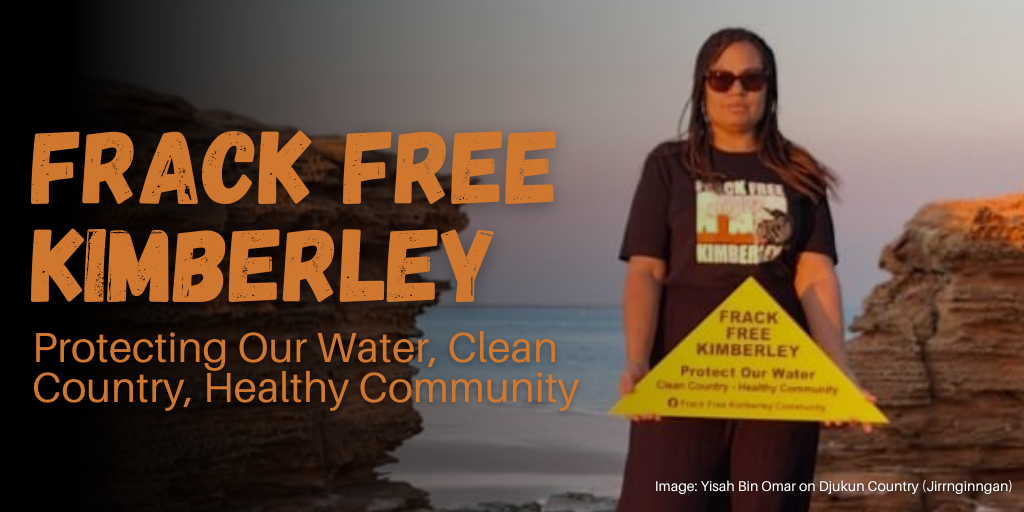Frack Free Kimberley: Protecting Our Water, Clean Country, Healthy Community

The Kimberley region, known for its stunning landscapes and deep cultural significance, is under threat from fracking. Yisah Bin Omar, a Djukun woman, is supporting the Frack Free Kimberley campaign to protect this precious and unique environment. In an interview, Yisah shared her perspective on the importance of the Kimberley, the dangers of climate change, and the urgent need to ban fracking in Western Australia:
“My name is Yisah Bin Omar. I am a Djukun woman living and working on Djukun Country. I was born and raised in the Kimberley and have lived here all my life. I want to also acknowledge my ancestral connections to other parts of the Kimberley through the Karajarri, Nyikina, and Kija people of the Kimberley Region,”
Yisah’s deep roots in the Kimberley shape her commitment to preserving this land for future generations. Her connection to the region is not just geographical but deeply spiritual and cultural:
“The Kimberley region is my home and like many First Nations mob living in the region, it’s our roots, our bloodline, it’s our lineage and it’s a large part of our identity. We are spiritually connected to Country!” Yisah explains. “We have a cultural obligation to protect Country as it has protected and sustained our family and ancestors for thousands and thousands of years. We have to ensure its protection for our current and future generations, those that will come after us. What we do now has an impact on the future so we need to tread lightly and really think about our steps.”
For Yisah and many others, the Kimberley is more than just a place; it is a living, breathing entity that nurtures and sustains their way of life.
Yisah’s concerns about climate change are immediate and personal.
“My concerns about climate change is there will be more frequent extreme weather like bushfires, heatwaves, and cyclones. There are six main towns in the Kimberley, but there are a lot more remote communities and outstations. Some Aboriginal communities don’t have the infrastructure to cope with events such as cyclones and need to be evacuated. Flooding can also cause displacement which we saw at the beginning of 2023 in Fitzroy Crossing and their outlying communities with a 1 in 100-year flood which they are still recovering from.”
The impacts of climate change threaten to make parts of the Kimberley uninhabitable within 50 years. “Where will our First Nations mob go? They will be climate refugees in their own country!” Yisah laments.
“The Kimberley is now in an urgent battle to stop fracking in Western Australia,” Yisah states firmly. “Our WA government has the power to stop fracking in the Kimberley! The McGowan Government banned fracking in parts of WA (southwest of WA, Peel, Perth, and Dampier Peninsula areas) but opened the Kimberley to fracking in 2018. Why not ban fracking in all of WA?”
Yisah calls for a legislated fracking ban in the Kimberley to prevent pollution of the region’s precious water sources. “We need to achieve a legislated fracking ban in the Kimberley to prevent pollution to our Kimberley water, our aquifers, our wetlands, and our rivers like the Martuwarra Fitzroy River because ‘Water is life!'”
The Frack Free Kimberley campaign seeks to protect the region’s water, country, and community from the dangers of fracking. Through collective action and a strong message to the government, the campaign aims to ensure that this unique and vital part of Australia remains pristine and vibrant for generations to come.
This is a republished article from Djukun Nation. Original article here.



